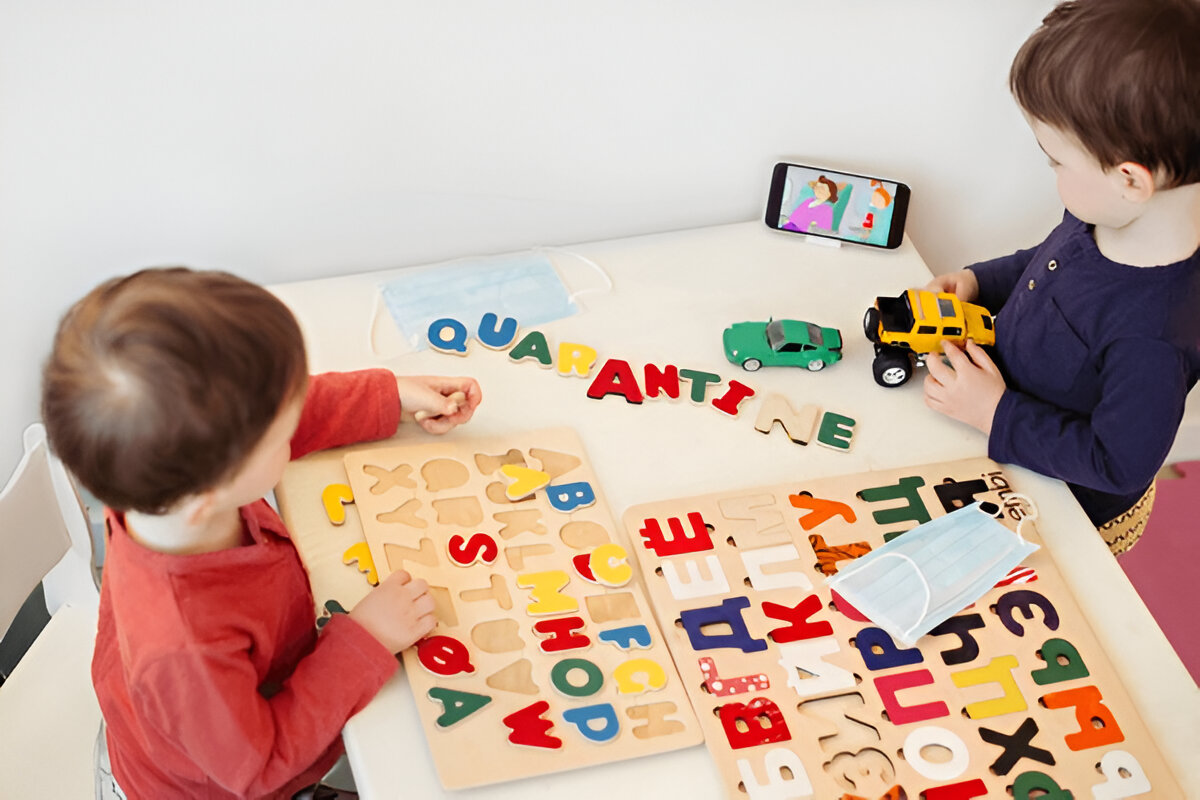Toddlers are packages of energy, inquisitiveness, and questions. They learn something new each and every day by observing and listening. The most critical aspect that toddlers learn at this stage is language. The more they hear and comprehend words, the more effectively they are able to communicate using their mind, needs, and feelings.
Parents want to know how to get toddlers to learn new words but in a way that does not sound like a lesson. The truth is, toddlers will pick up more when they are relaxed and not tense, and when they are enjoying themselves. You do not need to sit down with them and learn. You just have to talk, listen, play, and explore with them in a natural manner.
In this blog post, we are going to share with you 5 easy ways to teach toddlers new words daily. They are simple to implement and can easily be woven into your daily routine. These steps will enhance your toddler’s vocabulary, speaking confidence, and world they perceive.
1) Talk to Your Toddler During the Day
One of the best ways to introduce new words to toddlers is to discuss things with them. Sounds too easy, but it works. Your toddler learns words by hearing what you say and how you describe things.
Dress them up and also label the clothes. Say “Let’s put on your blue shirt” or “Your soft towel.” At eating times, also label the food. Say “You’re eating rice” or “Let’s have some water.” When you walk outside, point to and label things like cars, dogs, or flowers.
Talk slowly and loudly. Repeat frequently. Use short, simple sentences. For instance, rather than saying, “Look at the pretty butterfly on that leaf,” say, “Look at the butterfly. It is on a leaf.” Repeating words allows toddlers to commit words to memory.
The aim is to get your child to associate common objects and activities with words for them. This constant conversation provides a solid foundation for toddler language skills.
2) Read Stories Daily
The most effective method of instructing new words to toddlers is through reading stories. Storybooks contain words that do not necessarily appear in day-to-day conversations, but that expose them to new concepts, emotions, and movements. Toddlers also learn sentence formation and usage of words to narrate a story.
Select books with large pictures, few words, and short sentences. Touch the pictures and point to objects. Ask questions such as “What is the dog doing?” or “Where is the sun?” Wait for your toddler to answer, even if it is only with a sound or gesture. This makes reading a participatory activity.
You can also read the same book over and over again. Repetition is something toddlers like. It helps them remember words, sentence order, and the flow of a story. Eventually, they may even try to read the words with you.
When you are away or busy, you can utilize tools such as Kinzy. It allows your child to listen to the stories that you narrated. This individualizes and comforts storytime yet aids in language development.
3) Insert New Words into the Scene with Everyday Situations
Life is full of opportunities to instruct toddlers about new words. No classroom required. Your living room, kitchen, grocery store, or park will do.
While cooking, allow your toddler to observe and label the vegetables, fruits, or kitchen utensils. During bath time, use the words soap, towel, water, or splash. During a visit to the park, use the words trees, swings, birds, and clouds.
Speak of what your child is doing and perceiving. For instance, if your toddler is jumping, you can say “You’re jumping high!” or “Let’s jump together.” This assists them in making the word associate with the action.
If your toddler points to something or is interested in making a noise, imitate them and label it. Toddlers are better at remembering words if they are interested or excited about a thing.
This learning through everyday moments in an incidental way makes word learning simple, hassle-free, and convenient.
4) Sing Songs and Rhymes
Songs and rhymes are a great way of building toddler vocabulary. They are rhythmic, repetitive, and use simple words that can be easily imprinted on the memory. Singing makes children listen to how words sound, how sentences are constructed, and how language can be used for entertainment.
You can also sing songs that you already know, such as “Twinkle Twinkle Little Star” or “Old MacDonald Had a Farm.” You can even come up with your own little ditties that have something to do with what you are doing. Like, “Now we wash our hands, splash splash splash.”
Use the movements along with the words. Clap your hands, stomp your feet, or point to objects when singing. This helps connect movement and words, which is helpful for speech and memory.
Singing daily makes learning fun, and kids enjoy singing the same songs repeatedly. It is that repetition that helps them learn and remember new words.
5) Get Your Toddler to Talk
Kids must be talked to, but they must also attempt to speak. So provide plenty of opportunities for your toddler to speak. You can do this by asking straightforward questions, waiting for them to respond, and reacting with excitement when they attempt to say something.
When your child points at an object and makes a sound, tell the correct word. For instance, if he pronounces “ba” when pointing at a ball, you would tell him, “Yes, that’s a ball!” This is one of the ways they would learn the correct word without having to correct too much.
Ask them questions that are open-ended such as “What do you see?” or “What do we do next?” and not yes or no questions. This encourages them to think and experiment with new words.
You can also play word games in which you say a word and then ask them to find it. For instance, “Where’s the apple?” or “Pass me the spoon.” These kinds of games make conversation a game.
If your child enjoys hearing stories, then apps such as Kinzy enable them to hear voice-storytelling, retell the story back after hearing it, or even create their own story from simple choices. This type of interactive learning reinforces word development in a lighthearted manner.
Final Thoughts
It does not take much effort to help your child learn new words. With some effort and good habits, you can teach toddlers one new word each day naturally in a playful way. Chatter, reading books, singing nursery rhymes, making the most of the normal events in life, and chatting with your toddler – all these together strengthen language skills.
Keep the following in mind: it’s not about how many words your child knows. It’s providing them with lots of language experience where they feel comfortable and want to speak, ask, and communicate.
At Kinzy, we feel that learning must be as fun as a game and never a lesson. And that is the reason we design tools where your child can hear your voice, jump into stories, and talk at their own pace – and each moment is a learning and growing opportunity.
Want to bring up a chatty, confident toddler? Just chat, sing, read, and play – word for word.
Try out our App:
App Store: https://apps.apple.com/in/app/kinzy/id6743426150
Play Store: https://play.google.com/store/apps/details?id=club.kinzy.app&hl=en_IN ↩︎





